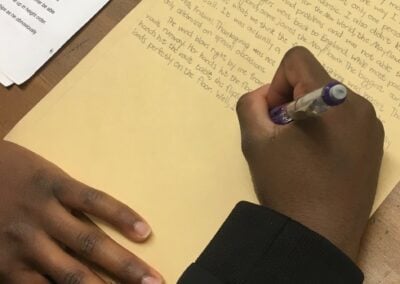
We’ve all seen scaffolding set up around a building during construction or renovation, right?
Scaffolding is simply a temporary support.
When it comes to learning to write, our students need scaffolding. And that scaffolding is a partnership: Blackbird & Company + YOU!
But I often cross paths with parent-teachers who feel ill-equipped to teach writing.
Each and every time I say, “YOU are equipped to mentor writing! Trust me. You are…”
I go on to share the reality that writing is NOT calculus. Writing is an art form. Then I ask, “Do you like to read (even a little bit)? If so, this equips you more than most to mentor student writers.” That’s right, more than most.
Let’s go back to “writing is an art form” and begin there. Everything you’ve ever read and everything you ever will read began as an idea in someone’s mind. So when you approach a student’s idea as a reader, you will be doing exactly what happens in a graduate school writing workshop!
When it comes time to read your student’s first draft, rough draft, sloppy copy, whatever you want to call it, the task at hand is to ask yourself, “What is my student’s BIG idea?” From there the task of helping your students communicate concisely and creatively. Your task, as writing mentor, is to mine for the idea that has been drafted, and to excavate as if you might score a diamond! The thing is, you likely will if this is your mindset.
During the mentor/student conference, have the student read the draft aloud. Use your red pen to correct spelling and punctuation errors along the way, as the idea is being read. Put a friendly little check mark atop sentence fragments, run-ons, or places that are missing something. Discuss these areas after the student has finished reading. Often during the read aloud the student will catch little errors. Keep the conference caring and consequential. Consequential, yes. Think of it like this: The consequence of not using the red pen is the shrinking of the student’s idea! Remind your student, the red pen is a friend!
You don’t need to hold an advanced degree in writing to be a writing mentor.

You DO need to keep in mind that ideas are the substance of art, and as such are subjective in nature. Writing is always meant to be read. Approach ideas, not as a grammar-and-mechanics-patrol-person, but as a reader who wants to be intrigued and inspired. Being intrigued and inspired will motivate you, the writing mentor, to simply protect and promote the idea at hand.
The scaffolding inside each of our Discovery Guides, supports your students in the important work of writing.
Whether your child is in the 1st grade learning to encode simple ideas while mastering advanced phonics and constructing the four types of sentences, in the 3rd grade learning to construct sentences using the eight parts of speech, in the 6th grade being introduced to essay form, or in the 11th grade exploring intermediate composition and constructing persuasive essays, we’ve got you!
Our scaffolding provides step-by-step guidance that inspires students in the writing process, while equipping you to support them each step of the way.
~Kimberly
